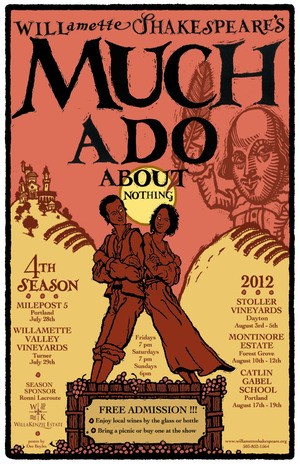When Claudio asks Benedick what he thinks of Hero, Benedick replies, “
And that was exactly how I felt about Willamette
Shakespeare’s Much Ado About Nothing. It’s hard to pin down what didn’t
work for me. There were a lot of good things about the production, and yet, it
fell flat.
Jason Maniccia was one of the highlights. His Benedick was
solid, and he looked at home in the part. I could believe in all of Benedick’s
changing moods – his self-confidence, his mockery, his frustration with
Beatrice, his love-induced melancholy and his puppy love. My only
disappointment was that he could have made so much more of the eavesdropping
scene, but that is probably more director Daniel Somerfield’s fault.
Ithica Tell made a smart, sassy Beatrice. She made the
400-year-old puns and wordplays feel fresh and spontaneous and biting. But I
could never really buy the bit where Beatrice is in love with Benedick. And
unfortunately, most of the rest of the cast didn’t play up to her energy level,
and so she felt out of place. I would really like to see her in some
fast-paced, high-energy productions. I think she would be brilliant.
This production, however, was not fast-paced or high-energy.
Chris Ringkamp’s Claudio was eager and innocent and young
and in love, but Holly Wigmore’s flat performance of Hero gave him nothing to
work with. Where Chris really shone was as one of the watch, where he could
play more of a comic role, and where the other actors’ energy was infectious.
Most of that energy came from Clara-Liis Hillier (Constable
Dogberry) and Lauren Modica (Verges) who absolutely stole the show. Every moment
they were on stage was a gem. Their timing, their expressions, the way they
stayed so wonderfully in character when the focus was not necessarily on them –
they were wonderful! And costume designer Clare Parker did a bang-up job with
their costumes, too. I particularly loved Dogberry’s skunk necktie with the
squeaker, and Verges’s fez.
Composer and musician Jason Okamoto also deserves praise for
his beautiful music (performed by him and Ali Ippolito). It gave just the right
flavor and helped create the mood where other aspects failed.
One of the main problems with this production was the
timing. Was it really necessary to break up the flow of the whole thing by
having stagehands rearrange the benches every scene? It didn’t contribute to
the sense of location or setting, and it killed what little energy there was in
the last scene. If the benches absolutely have to be moved, why not have the
actors do it as part of their scene? Another timing issue was that actors would
often do their actions and then speak their lines – but not at the same time.
Guys? We’re not that interested in watching you play a game of lawn bowls. And
when the play has a lot of talking in it, you don’t want to drag it out any
more than necessary.
So timing was a problem. Lack of energy was a problem.
Several poor performances contributed to the overall lack of sparkle. In
general, I found it a good time to work on my quilt. Which is saying something
on a 100-degree day.

No comments:
Post a Comment